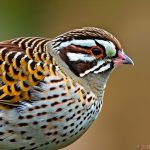Coturnix quail chicks are small, delicate birds that are popular among poultry enthusiasts for their small size, fast growth, and delicious eggs. These tiny creatures are often raised for their meat and eggs, making them a valuable addition to any homestead or small farm. Coturnix quail chicks are known for their rapid growth and can reach maturity in just 6-8 weeks, making them a popular choice for those looking to raise poultry for food production. These birds are also relatively easy to care for, making them an ideal choice for beginners or those with limited space.
Coturnix quail chicks are known for their gentle nature and can be easily tamed with proper handling and care. They are also relatively quiet birds, making them a great choice for those living in urban or suburban areas where noise may be a concern. These birds come in a variety of colors, including brown, white, and speckled, making them a visually appealing addition to any flock. Overall, Coturnix quail chicks are a valuable and rewarding addition to any poultry operation, providing both meat and eggs in a small and manageable package.
Key Takeaways
- Coturnix quail chicks are small, delicate birds that require special care and attention.
- Common causes of coturnix quail chicks’ death include improper housing, nutrition, and exposure to disease and parasites.
- Proper care and housing for coturnix quail chicks involves providing a clean and warm environment with access to food and water.
- Nutrition and feeding for coturnix quail chicks should include a balanced diet of high-quality feed and access to grit for digestion.
- Preventing disease and parasites in coturnix quail chicks requires regular cleaning, monitoring for signs of illness, and practicing good biosecurity measures.
Common Causes of Coturnix Quail Chicks’ Death
Despite their hardy nature, Coturnix quail chicks are susceptible to a number of common causes of death that can be easily prevented with proper care and attention. One of the most common causes of death in quail chicks is dehydration. These tiny birds have high metabolic rates and require constant access to fresh water in order to stay healthy. Without an adequate supply of water, quail chicks can quickly become dehydrated, leading to illness and death. It is important to regularly check waterers and ensure that they are clean and filled with fresh water at all times.
Another common cause of death in Coturnix quail chicks is overcrowding. These birds require plenty of space in order to thrive, and overcrowding can lead to stress, aggression, and even cannibalism. It is important to provide ample space for quail chicks to move around and establish a pecking order without feeling crowded or threatened. Additionally, proper ventilation is crucial in preventing respiratory issues that can arise from overcrowding and poor air quality. By providing a clean and spacious environment for quail chicks, many common causes of death can be easily prevented.
Proper Care and Housing for Coturnix Quail Chicks
Proper care and housing are essential for the health and well-being of Coturnix quail chicks. When it comes to housing, it is important to provide a clean and well-ventilated environment that protects the chicks from predators and the elements. A secure coop or brooder with a solid floor is essential for keeping quail chicks safe from predators such as rats, snakes, and birds of prey. Additionally, it is important to provide a heat source such as a heat lamp or heating pad to keep the chicks warm, as they are particularly vulnerable to cold temperatures.
In terms of care, it is important to handle quail chicks gently and regularly in order to tame them and reduce stress. It is also important to provide a balanced diet that meets their nutritional needs, as well as access to fresh water at all times. Cleanliness is also crucial when it comes to caring for quail chicks, as they are susceptible to illness and disease in dirty environments. Regularly cleaning the brooder or coop, as well as providing fresh bedding, will help to keep quail chicks healthy and happy.
Nutrition and Feeding for Coturnix Quail Chicks
Proper nutrition is essential for the health and growth of Coturnix quail chicks. These tiny birds have high metabolic rates and require a diet that is high in protein in order to support their rapid growth. A commercial game bird starter feed with at least 24% protein is recommended for quail chicks, as it provides the essential nutrients they need for healthy development. It is important to provide access to feed at all times, as well as offering small amounts of finely ground grit to aid in digestion.
In addition to commercial feed, it is important to supplement the diet of quail chicks with fresh greens and insects in order to provide variety and additional nutrients. Chopped leafy greens such as spinach, kale, and lettuce can be offered as treats, as well as small insects such as mealworms or crickets. It is important to avoid feeding quail chicks foods that are high in salt or sugar, as well as any foods that are toxic to birds such as avocado or chocolate.
Preventing Disease and Parasites in Coturnix Quail Chicks
Preventing disease and parasites is essential for the health and well-being of Coturnix quail chicks. One of the best ways to prevent disease is by providing a clean environment with good ventilation and proper sanitation practices. Regularly cleaning the brooder or coop, as well as providing fresh bedding, will help to prevent the buildup of bacteria and parasites that can lead to illness. It is also important to practice good biosecurity measures, such as limiting exposure to wild birds and other poultry in order to prevent the spread of disease.
In addition to proper sanitation, it is important to monitor the health of quail chicks regularly in order to catch any signs of illness early on. Common signs of illness in quail chicks include lethargy, loss of appetite, diarrhea, or respiratory issues. If any of these symptoms are observed, it is important to isolate the sick bird from the rest of the flock in order to prevent the spread of illness. Seeking veterinary care at the first sign of illness is crucial in order to prevent the spread of disease and ensure the health of the entire flock.
Handling and Stress Management for Coturnix Quail Chicks

Proper handling and stress management are essential for the health and well-being of Coturnix quail chicks. These tiny birds are easily stressed by loud noises, sudden movements, or rough handling, so it is important to approach them gently and calmly in order to reduce stress. Regularly handling quail chicks from a young age can help to tame them and make them more comfortable with human interaction.
It is also important to provide a quiet and calm environment for quail chicks in order to reduce stress. Loud noises, bright lights, or overcrowding can all contribute to stress in quail chicks, so it is important to provide a peaceful environment with plenty of space for the birds to move around freely. Additionally, it is important to avoid introducing new birds into the flock too quickly, as this can lead to aggression and stress among the birds.
Seeking Professional Help for Coturnix Quail Chicks
In some cases, seeking professional help may be necessary in order to ensure the health and well-being of Coturnix quail chicks. If you notice any signs of illness or distress in your quail chicks, it is important to seek veterinary care as soon as possible in order to prevent the spread of disease and ensure the health of the entire flock. A qualified avian veterinarian will be able to diagnose and treat any illnesses or injuries that may arise, as well as provide guidance on proper nutrition, housing, and care for quail chicks.
In addition to veterinary care, it may also be helpful to seek advice from experienced poultry keepers or breeders who have knowledge and experience with raising Coturnix quail chicks. These individuals can provide valuable insight into proper care and management practices that can help to ensure the health and well-being of your quail chicks. By seeking professional help when needed, you can ensure that your quail chicks receive the best possible care and support for a long and healthy life.
If you’re struggling with coturnix quail chicks dying, it’s essential to ensure that your coop is providing the right environment for them to thrive. A recent article on PoultryWizard.com discusses the importance of choosing the best coop for chickens and how the size of the coop can impact their well-being. Understanding these factors can help create a healthier and safer environment for your quail chicks. Check out the article here for valuable insights on coop selection and its impact on poultry health.
FAQs
What are some common reasons why coturnix quail chicks may be dying?
Some common reasons why coturnix quail chicks may be dying include inadequate temperature control, poor nutrition, dehydration, overcrowding, and genetic defects.
How can I ensure proper temperature control for coturnix quail chicks?
To ensure proper temperature control for coturnix quail chicks, it is important to provide a brooder with a heat lamp or heat pad to maintain a temperature of around 95-100°F for the first week, gradually decreasing by 5°F each week until reaching room temperature.
What should I feed coturnix quail chicks to prevent deaths from poor nutrition?
Coturnix quail chicks should be fed a high-quality game bird starter feed with at least 24% protein. Additionally, providing access to clean water and occasionally adding vitamins and electrolytes to their water can help prevent deaths from poor nutrition.
How can I prevent deaths from dehydration in coturnix quail chicks?
To prevent deaths from dehydration in coturnix quail chicks, it is important to ensure that they have constant access to clean water. Additionally, adding electrolytes to their water can help prevent dehydration.
What are some signs of overcrowding in coturnix quail chicks and how can I prevent deaths from this?
Signs of overcrowding in coturnix quail chicks include excessive pecking, stress, and trampling. To prevent deaths from overcrowding, it is important to provide enough space for the chicks to move around and avoid overcrowding them in the brooder.
Are there any specific genetic defects that may cause coturnix quail chicks to die?
Yes, some specific genetic defects that may cause coturnix quail chicks to die include splay leg, curled toe paralysis, and other developmental abnormalities. It is important to carefully select breeding stock to minimize the risk of genetic defects in chicks.
Meet Walter, the feathered-friend fanatic of Florida! Nestled in the sunshine state, Walter struts through life with his feathered companions, clucking his way to happiness. With a coop that’s fancier than a five-star hotel, he’s the Don Juan of the chicken world. When he’s not teaching his hens to do the cha-cha, you’ll find him in a heated debate with his prized rooster, Sir Clucks-a-Lot. Walter’s poultry passion is no yolk; he’s the sunny-side-up guy you never knew you needed in your flock of friends!







